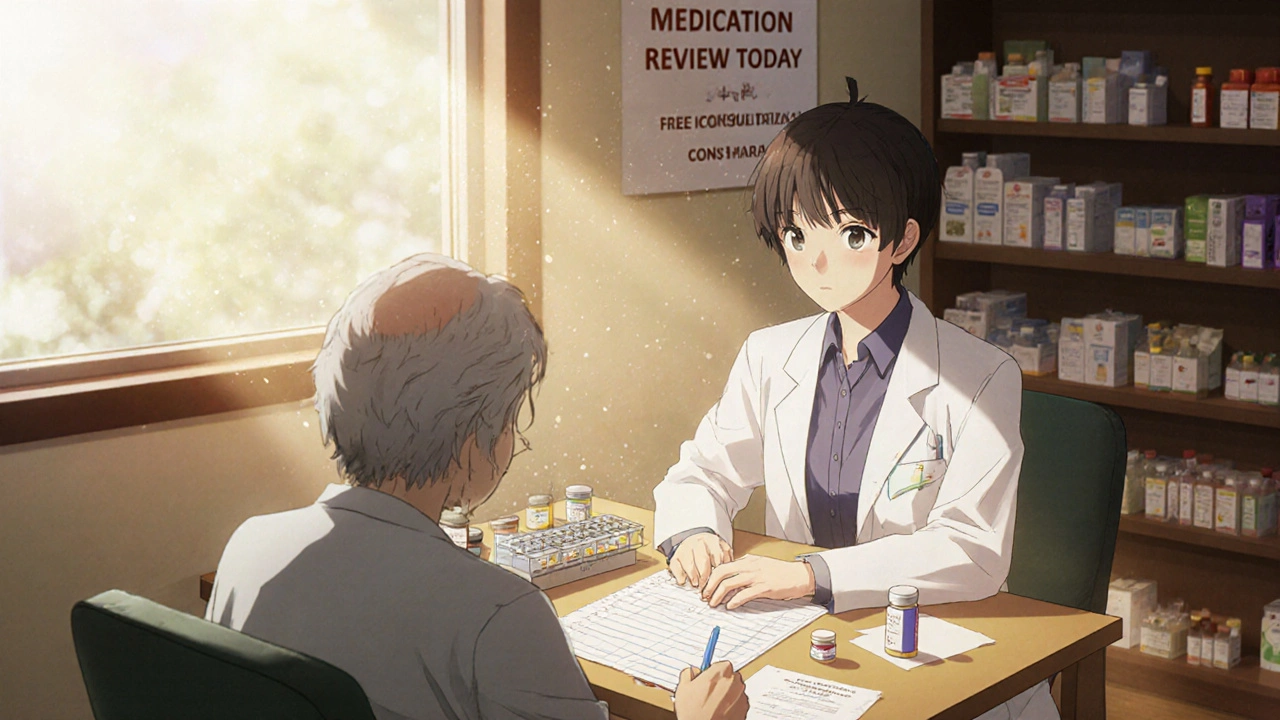
Most people think of their pharmacy as just a place to pick up prescriptions. But if you’re taking more than a few medications - especially for chronic conditions like diabetes, high blood pressure, or heart disease - your pharmacist is one of the most important people in your healthcare team. And you don’t need a doctor’s referral to talk to them. All you need to do is ask.
Pharmacies in the U.S. now offer free or low-cost consultation services designed to catch dangerous drug interactions, reduce side effects, lower costs, and make sure you’re actually taking your meds the right way. These aren’t just quick check-ins. They’re full medication reviews, often lasting 15 to 30 minutes, where a pharmacist sits down with you - one-on-one - and walks through every pill, patch, and inhaler you use.
What Happens During a Pharmacy Consultation?
A proper medication consultation isn’t just about checking if you have refills. It’s a deep dive. Your pharmacist will ask you to bring all your medications: prescription drugs, over-the-counter pills, vitamins, herbal supplements, and even topical creams. Many people forget that things like ibuprofen, melatonin, or fish oil can interact with blood thinners or blood pressure meds.
During the review, the pharmacist checks for:
- Drug-to-drug interactions - for example, mixing statins with grapefruit juice or taking too much acetaminophen across multiple cold medicines
- Duplicate therapies - two different prescriptions doing the same thing, which can lead to overdose
- Incorrect dosages - like taking a 10mg pill when you only need 5mg
- Medications you no longer need but haven’t stopped
- Side effects you might have ignored or blamed on aging
They’ll also look at your adherence. How often do you miss doses? Do you have trouble opening bottles? Do you take your pills at the same time every day? These small things add up. A 2022 study found that patients who had regular pharmacist consultations improved their medication adherence by 76%.
Who Qualifies for Free Consultations?
If you’re on Medicare Part D and take multiple chronic condition medications, you’re likely eligible for free comprehensive Medication Therapy Management (MTM) services. As of 2023, all Medicare Part D plans are required to offer them. You don’t need to sign up separately - your plan will usually notify you if you qualify.
Eligibility rules changed in April 2023. Now, if you take three or more medications for chronic conditions - like diabetes, high cholesterol, COPD, or heart failure - and spend over $5,000 a year on prescriptions, you qualify. That’s a big change. Before, you needed two conditions and eight or more meds. Now, it’s much easier to get in.
Even if you’re not on Medicare, many private insurers now cover these services. Around 43% of large employer plans include MTM benefits as of 2023. Call your insurance company and ask: “Do you cover pharmacist-led medication reviews?” If they say no, ask them to check again - coverage is expanding fast.
Why Pharmacists Are Your Best Line of Defense
You see your doctor maybe once or twice a year. You visit your pharmacy 17 times a year on average. That’s nearly twice as often. Pharmacists are there every time you refill a prescription. That means they see patterns others miss.
A 2023 analysis of Veterans Affairs medical centers showed that pharmacist-led consultations prevented 1,247 serious adverse drug events in just one year. That’s not just a number - that’s 1,247 people who didn’t end up in the ER because someone caught a dangerous mix of meds before it was too late.
One real case: A diabetic patient was taking high-dose insulin, but his blood sugar kept dropping. His doctor thought he was eating too little. His pharmacist noticed he was also taking a new antibiotic - a known trigger for low blood sugar. The pharmacist switched the antibiotic, and within days, his glucose levels stabilized. No hospital visit. No emergency. Just a 15-minute chat.
Pharmacists also save you money. In one Trustpilot review, a patient saved $200 a month because their pharmacist found a generic alternative that worked just as well. Another patient discovered they were paying $120 for a pill that cost $15 at a different pharmacy - and the pharmacist helped them switch.
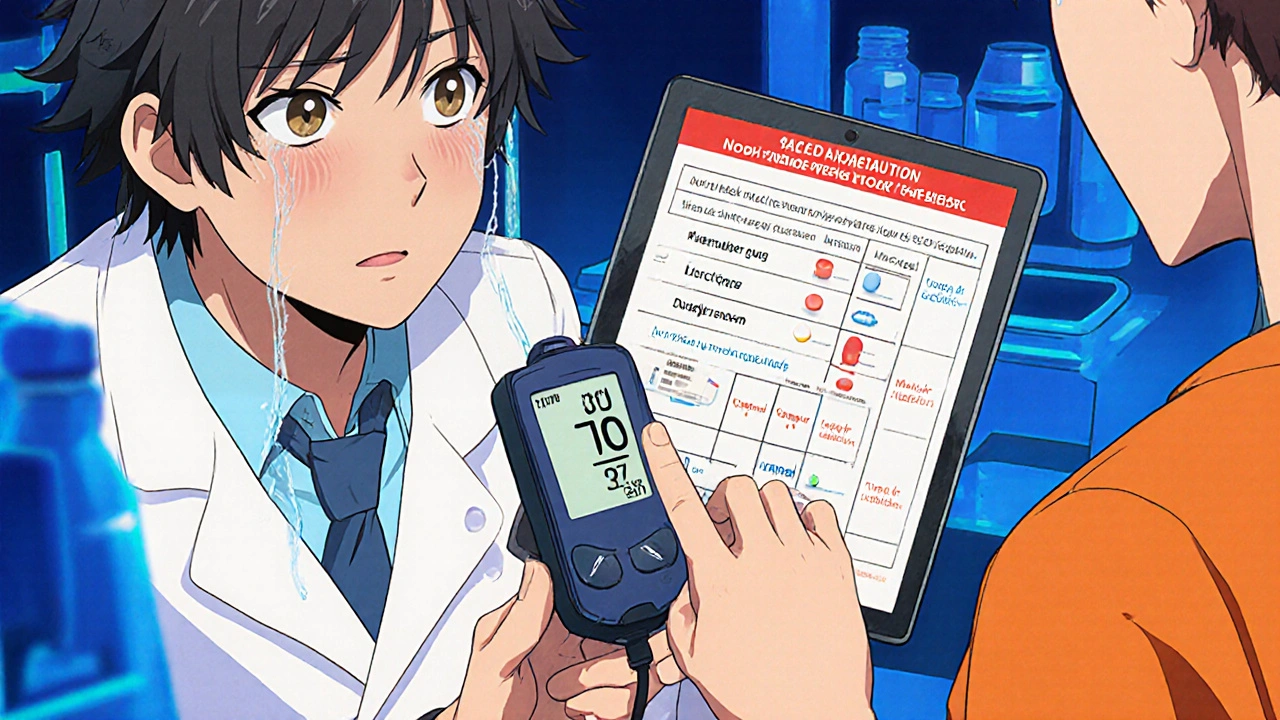
How to Get the Most Out of Your Consultation
Not all consultations are created equal. To make sure you get real value, follow these steps:
- Bring everything. Include all prescriptions, OTC meds, supplements, creams, patches, and even eye drops. Use a pill organizer or take photos of your bottles.
- Write down your questions. Are you confused about when to take your pills? Worried about side effects? Feeling dizzy after lunch? Don’t assume the pharmacist will guess.
- Ask for a written plan. A good consultation ends with a personal medication record and an action plan - a one-page summary of what you’re taking, why, and what to watch for. Keep this in your wallet or phone.
- Ask about cost-saving options. Ask: “Is there a cheaper version?” “Can I switch to a 90-day supply?” “Are there patient assistance programs?”
- Follow up. Don’t wait for your next refill. If you feel worse after starting a new med, call your pharmacist before your doctor’s office opens.
Many pharmacies now offer scheduled consultation times - like “Medication Review Tuesdays” - so you don’t have to wait in line. Call ahead and ask if they have a quiet room for consultations. About 68% of U.S. community pharmacies now have private spaces for these talks.
What If Your Pharmacy Doesn’t Offer Consultations?
If your local pharmacy doesn’t offer consultations, ask why. Most do - 97% of U.S. community pharmacies offer some form of medication review. If they say they don’t, ask if they can refer you to another location. Chain pharmacies like CVS, Walgreens, and Rite Aid all have MTM programs. Independent pharmacies often offer even more personalized service.
Still stuck? Try telehealth. Since the pandemic, 62% of pharmacies now offer virtual consultations. You can talk to a pharmacist from your kitchen, using your phone or computer. Just ask: “Do you offer phone or video medication reviews?”
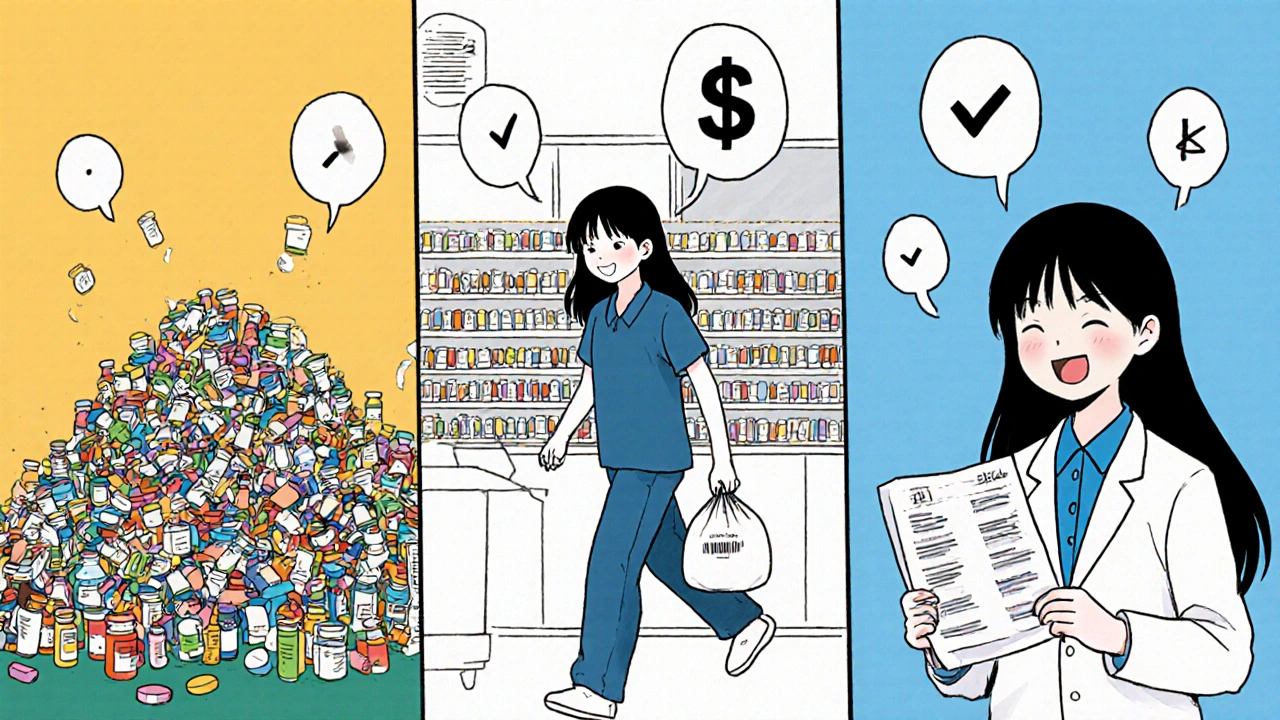
Common Myths About Pharmacy Consultations
Myth: “My doctor already checks my meds.” Doctors see hundreds of patients a week. They rarely have time to review every drug interaction. Pharmacists specialize in this. They’re trained to spot what doctors miss.
Myth: “I only take a few pills - I don’t need it.” Even two or three meds can interact. A common combo: blood pressure meds + NSAIDs (like ibuprofen) = kidney damage. Your pharmacist can catch that.
Myth: “It’s too expensive.” If you’re on Medicare Part D, it’s free. Even if you’re not, many pharmacies offer free 10-minute check-ins. Paying $25-$75 for a consultation that could prevent an ER visit worth $10,000? That’s a bargain.
Myth: “They’ll just tell me to stop my meds.” Pharmacists don’t change your prescriptions. They flag issues and recommend changes to your doctor. You always have the final say.
What to Do After Your Consultation
After your session, you should walk away with:
- A printed or digital list of all your current medications - with dosages and times
- A clear action plan: what to watch for, when to call your doctor, what to avoid
- Answers to your top questions
- Knowledge of any cost-saving options
Keep this document with your medical records. Bring it to every doctor’s appointment. Share it with family members who help you manage your care.
And schedule your next consultation. Medications change. Conditions change. You should have a full review at least once a year - or anytime you start or stop a drug.
Why This Matters More Than Ever
Medication errors are the third leading cause of death in the U.S. - ahead of strokes and Alzheimer’s. Most of these errors happen because of poor communication, not bad science. Your pharmacist is the only healthcare provider who sees your full medication picture every single time you refill a prescription.
They’re not just dispensers. They’re safety netters. They’re cost savers. They’re educators. And they’re waiting for you to ask.
You wouldn’t drive a car without checking the oil. Don’t take your meds without checking with your pharmacist.
Are pharmacy consultations really free?
Yes, if you’re on Medicare Part D and meet the eligibility criteria - taking three or more chronic condition medications and spending over $5,000 annually on prescriptions. Many private insurers also cover these services at no cost to you. Even if you don’t qualify for free MTM, most pharmacies offer free 10- to 15-minute medication reviews as part of their standard service.
Can my pharmacist change my prescription?
No. Pharmacists can’t change your prescription without your doctor’s approval. But they can flag potential problems - like dangerous interactions, duplicate drugs, or incorrect doses - and recommend changes to your doctor. They’ll often call your doctor directly to suggest a safer alternative. You always have the final say on what you take.
How often should I get a medication review?
At least once a year. But you should schedule a review anytime you start or stop a medication, see a new doctor, or notice new side effects. If you’re on multiple chronic medications, quarterly check-ins can be helpful - especially if your health changes.
What if I’m uncomfortable talking to my pharmacist?
You’re not alone. Many people feel nervous about asking questions. But pharmacists are trained to listen without judgment. If you don’t feel comfortable with your current pharmacist, ask to speak with another one at the same pharmacy. Most pharmacies have multiple staff members. You can also request a private consultation room - 68% of U.S. pharmacies now offer them.
Can I get a consultation over the phone or video?
Yes. Since 2020, 62% of pharmacies now offer virtual consultations via phone or video call. This is especially helpful if you have mobility issues, live far from a pharmacy, or prefer to talk from home. Just ask your pharmacy if they offer telehealth medication reviews.
Do I need to make an appointment?
It depends on the pharmacy. Some offer walk-in consultations, but many now schedule dedicated consultation times - like “Medication Review Tuesdays” - to ensure privacy and enough time. Calling ahead saves you from waiting. Ask: “Do you have a set time for medication reviews?” or “Can I schedule a 20-minute consultation?”
Will my doctor be informed about the consultation?
Yes - if you give permission. Most pharmacies will send a summary of your consultation to your doctor, especially if they’re part of the same health system. This helps your doctor stay updated on your medication changes and reduces the risk of conflicting advice. Always ask what information will be shared and with whom.
Can a pharmacist help me save money on my meds?
Absolutely. Pharmacists know which medications have cheaper generics, which manufacturers offer patient assistance programs, and how to switch to 90-day supplies to reduce co-pays. One patient saved $200 a month just by switching to a generic version of a brand-name drug their pharmacist recommended. Always ask: “Is there a lower-cost option?”

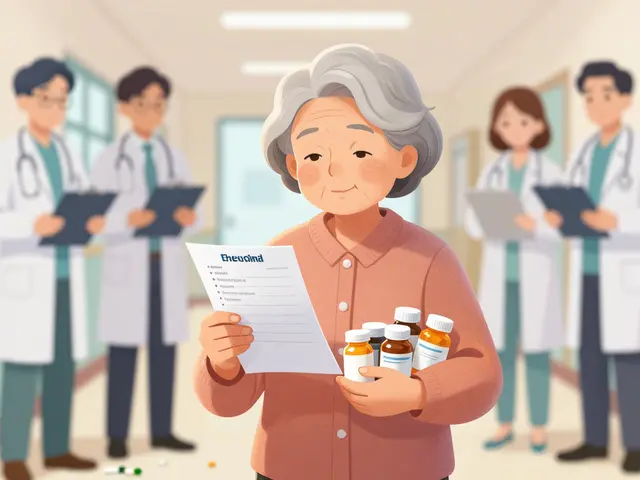
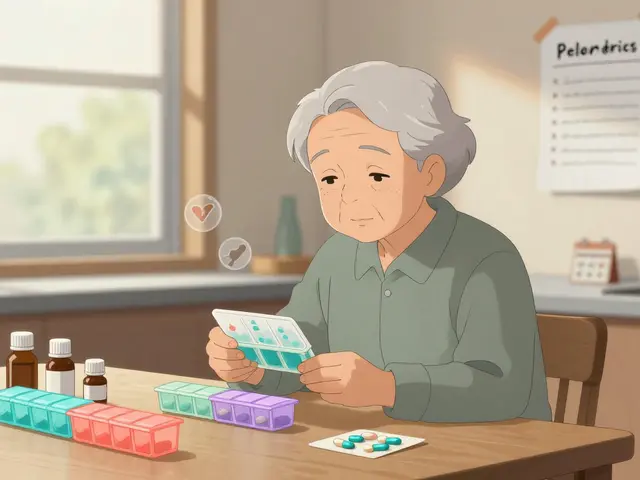

Let me just say this-pharmacists? They’re not healers, they’re not even clinicians-they’re corporate drones with access to your pill bottle and a script to upsell you on probiotics you don’t need. You think they care about your ‘medication safety’? Nah. They’re paid per consultation, and if they catch a drug interaction? Great. If they don’t? You’re just another data point in their quarterly report. I’ve seen it: they push generics like they’re holy water while ignoring your actual symptoms. And don’t get me started on the ‘free’ services-free for you, profitable for them. They don’t want to help you-they want to control you. And yes, I’ve been through it. I know.
i never thought about talking to my pharmacist like this but now i see why it makes sense. i take three meds for my blood pressure and diabetes and i just assume the doctor knows everything. turns out my pharmacist noticed i was taking two different pills that did the same thing. she switched me to one and saved me like 60 bucks a month. simple stuff but no one ever told me to ask.
Okay so here’s the real story nobody’s telling you-pharmacies are basically front offices for Big Pharma’s surveillance network. They collect your data, track your refill patterns, and sell it to insurers and drug manufacturers who then target you with ‘special offers’ for new meds you don’t need. The ‘consultation’? A trap. You think they’re helping you? They’re mapping your body’s vulnerabilities. And don’t think I’m paranoid-I’ve seen the fine print in the consent forms they hand you while you’re waiting for your statin. It’s all about predictive analytics now. You’re not a patient-you’re a dataset with a pulse. And if you start asking questions about why your insulin dose changed? They’ll quietly flag you as ‘non-compliant’ and push you toward more expensive ‘specialty’ drugs. It’s not about safety. It’s about profit. And the government? They’re in on it. Medicare Part D? A Trojan horse. You think you’re getting free care? You’re getting enrolled in a data harvesting program disguised as healthcare. Wake up.
OMG YES!! I did my first med review last month and my pharmacist found I was taking 3 different things that all made me dizzy!! 😱 She switched me to a combo pill and now I don’t feel like I’m on a rollercoaster every morning!! 🙌 Thank you for posting this-I’ve been telling my friends to do this forever!!
While the post correctly highlights the value of pharmacist-led medication reviews, it underemphasizes the systemic barriers to access. Rural communities, elderly populations without transportation, and non-English speakers often face significant hurdles in scheduling consultations-even when they’re technically 'free.' Pharmacies in underserved areas frequently lack private consultation rooms, trained staff, or adequate time allocations. The assumption that 'all you need to do is ask' ignores structural inequities. True progress requires not just awareness but policy reform: mandatory staffing ratios, telehealth equity funding, and culturally competent outreach programs. We must move beyond individual responsibility and toward institutional accountability.
Why the hell are we trusting pharmacists with our meds? In America we got doctors for a reason. These guys are glorified cashiers with a pharmacy degree. I don’t need some guy in a white coat telling me how to take my pills. I’ve got my own brain. And if I want to take my blood pressure med with grapefruit juice? That’s my choice. Government telling me to go to the pharmacy for a 'review'? That’s socialism with a stethoscope.
MTM protocols are underutilized due to poor patient health literacy. Pharmacists operate within a constrained reimbursement paradigm-time-intensive counseling is not incentivized. The 76% adherence metric is statistically significant but conflates compliance with efficacy. Most patients fail to articulate polypharmacy risks because they lack pharmacokinetic literacy. Solution: mandatory pre-consultation digital modules. Also, stop calling it 'free.' It's a cost-shifted service funded by formulary rebates.
Yeah right. And I’m supposed to believe these pharmacy 'consultations' aren’t just a way to get you hooked on more expensive meds? Look at the data-when they 'catch' a duplicate therapy, what do they replace it with? A branded version with a higher profit margin. They don’t care about safety. They care about margins. And don’t even get me started on how they push you to switch to 90-day supplies so you can’t easily quit a bad drug. This is corporate medicine dressed up as help. You’re being manipulated.
It’s interesting how we’ve outsourced medical oversight to people whose primary function is transactional. The pharmacist’s role has shifted from dispenser to de facto clinical reviewer-not because it’s ideal, but because the system is broken. Doctors are overburdened, nurses are stretched thin, and pharmacists are the only ones left with the time, access, and training to spot patterns. But this shouldn’t be the norm. It’s a symptom. The real issue? Fragmented care. We treat medications like discrete objects rather than a dynamic system. The consultation is a bandage on a hemorrhage.
I’ve been taking the same meds for 12 years and never thought to ask for a review. Last year I finally did-and my pharmacist found I’d been taking a supplement that was making my blood pressure meds useless. She also showed me a generic that saved me $150/month. No drama. No pressure. Just quiet, expert help. I wish I’d done it sooner. If you’re on multiple meds, just ask. It takes 15 minutes. It could save your life.